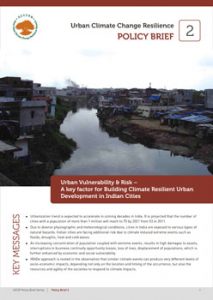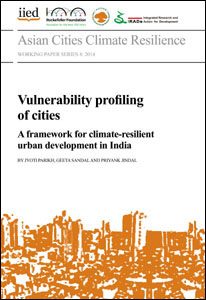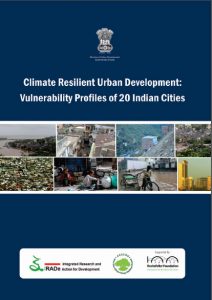Sustainable Urban Development > Publications
Urban Climate Change Resilience-POLICY BRIEF- Urban Vulnerability & Risk –A Key Factor for Building Climate Resilient Urban Development in Indian Cities
A policy brief was prepared to highlight the important factors for building climate resilience in Indian cities. IRADe approach was to promote the sustainable and disaster resilient approach. It suggests that cities have to put themselves on a sustainable path in terms of infrastructure, governance and socio-economic conditions to become resilient, unless these foundations are not strong and sustainable, cities cannot handle a new stress such as climate change.
The policy brief was presented at the first national “Emerging mechanisms and responses of cities to climate change” conference that has brought together the various approaches and experiences in developing resilience through actions in Asian Cities Climate Change Resilience Network (ACCCRN) cities across India.
Supported by: TARU Leading Edge Pvt. Ltd
Working Paper- Vulnerability Profiling of Cities-A framework for Climate-Resilient Urban Development in India
This working paper presents a holistic approach for urban climate resilience for a city to customise rapid vulnerability assessment. The framework highlights the impacts of climate change on urban services and systematic procedure to prepare datasets for vulnerability profiling of the cities in India.
It covers aspects related to the sensitivity and exposure of the cities. It also highlights the need for integration of climate resilience into urban planning. This framework was tested on twenty Indian cities that have diverse physiographic characteristics and demography. It provides added value in terms of information overview, collection and analysis of the existing data information, vulnerability assessment and indicators.
Supported by: International Institute for Environment and Development (IIED)
Climate Resilient Urban Development: Vulnerability Profiles of 20 Indian Cities
The study developed climate vulnerability profiles for 20 JNNURM cities. This is to assess the climate change induced risk of the cities including various hazards such as cyclones, storms, floods and droughts in the context of climate change and infrastructure needed for resilience. This is also to understand city level vulnerability in terms of socio-economic dimensions and nature of actions needed. This will help in raising awareness at various levels.
A coherent set of urban resilience measures were assessed, which merged with the ongoing natural hazard risk reduction and urban renewal interventions, minimizing the impacts of climate change on the cities and their inhabitants. IRADe staff conducted secondary survey, primary surveys, assessment study and provided analytical support.
Supported by the Rockefeller Foundation under ACCCRN Project
The Time is Now: Sustainable and Climate-Resilient Urban Development (2010)
This report relates the direct impacts of climate change such as extreme temperatures and floods as well as the indirect impacts of climate change such as changes in global grain markets that lead to spikes in food prices. With a rapidly growing urban population, the future challenges for urban administrations will be huge.
Supported by: Department for International Development and The Rockefeller Foundation. Co-organized with the Institute for Social and Environmental Transition
